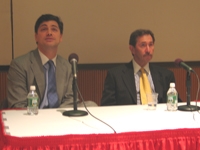
Dr. LaBruna (left) and Dr. Sorin (right) field questions from the audience at the October 25 Health and Wellness Seminar.
In a society increasingly focused on youth and a certain standard of beauty, more and more Americans are turning to reconstructive and dental cosmetic surgery to change the way they look. A new wave of reality television shows is fueling this trend, said Dr. Anthony LaBruna and Dr. Robert Sorin, who spoke on October 25 at the Health and Wellness Seminar at Weill Cornell Medical College. While television has informed the public about the possibilities of aesthetic-enhancing procedures, more often than not, however, "reality" shows can be anything but reality.
"Reality TV isn't necessarily interested in the best results," said Dr. Sorin, who is a clinical instructor in oral and dental surgery at Weill Cornell. "They want quick results because that's the more effective way to give the audience an emotional jolt within each episode."
With an average viewing audience of nearly 10 million, shows like ABC's "Extreme Makeover" and Fox's "The Swan" have been a serious cause for concern, according to a recent statement by the American Society of Plastic Surgeons. "Some patients on these shows have unrealistic and, frankly, unhealthy expectations about what plastic surgery can do for them," the statement reads.
Nearly 12 million plastic surgery procedures are performed every year, said Dr. LaBruna, assistant professor of otorhinolaryngology and plastic surgery, and director of facial plastic and reconstructive surgery at Weill Cornell. Among the more popular procedures are liposuction, breast augmentation, eye lift, nose job and face lift. The age group in which people most often receive plastic surgery is 35 to 50 (40 percent), followed by those 19 to 34 (26 percent), and 51 to 64 (24 percent). A majority of procedures are performed on women (87 percent, according to the American Society of Plastic Surgeons).
Dr. LaBruna voiced concern over the growing number of young people seeking cosmetic procedures for the wrong reasons, citing new shows like MTV's "I Want a Famous Face." Said Dr. LaBruna: "A show like this may be causing even young schoolgirls to have body-image problems. They think they have to be perfect."
Both Dr. LaBruna and Dr. Sorin stressed that elective surgery should be carefully considered, with the understanding that any type of procedure has risks. While it's not shown, participants on television shows sign lengthy release forms that delineate every possible outcome. Patients should also understand the true costs of surgery, in terms of both time and money. Although participants on reality TV shows may look perfect by the end of the one-hour program, the actual recovery time may take weeks.
Patients should think for themselves; their motivation has to come from within, said Dr. LaBruna, who always asks his patients why they are choosing cosmetic surgery. In some instances, patients are turned away. He pointed to the accommodators (such as those who seek cosmetic enhancement to satisfy a spouse), perfectionists, pushy parents, plastic-surgery addicts, and individuals with body-image disorder as those he might refer to a psychiatrist or psychologist instead.
The best candidates for aesthetic-enhancing procedures have a rational sense of self and realistic expectations of what cosmetic surgery can do for them, according to Drs. LaBruna and Sorin. These patients often have compelling emotional motivation for treatment, such as feelings of embarrassment, acute self-consciousness, unattractiveness, insecurity, and shame. Dr. Sorin related the story of one of his patients who was so ashamed of the way she looked, that when she laughed in public, she felt she needed to cover her mouth.

Dr. LaBruna shows before-and-after effects of using novel dermatologic equipment, such as the CoolTouch Laser.
Contestants on reality television shows have similar feelings of inadequacy, Dr. Sorin acknowledged, but reality TV often does not focus on the actual process of cosmetic or dental surgery. Too much emphasis is placed on the end product, rather than the means by which to get there, he said. Dr. Sorin cautioned that if a dental procedure on reality TV shows appears too simple, maybe it is. On many reality shows, imperfect teeth are corrected with caps or veneers, which may not always be the best solution. A proponent of biofunctional aesthetic dentistry, Dr. Sorin advocates both the health and function of the teeth in tandem with creating a beautiful smile. "It has to be a total package," he said, "but we have to fix the chewing machine first."
Patients should take their time and do research before signing up for a procedure, Dr. LaBruna advised. Some of the credentials patients should look for in a physician include board certification; a hospital affiliation; and membership to reputable societies, such as the American Society of Plastic and Reconstructive Surgery and the American Society of Aesthetic Plastic Surgery. Word-of-mouth, especially from nurses, is also an invaluable tool in finding the right surgeon, he said. Dr. LaBruna also warned against information and reviews from the Internet, because people can post anything online.
"Reality TV is correct in teaching us that emotions are important for those of us seeking cosmetic care," Dr. Sorin concluded. "How you feel about yourself is important."
"But take these shows with a grain of salt," said Dr. LaBruna.
Photos by Andria Lam.

